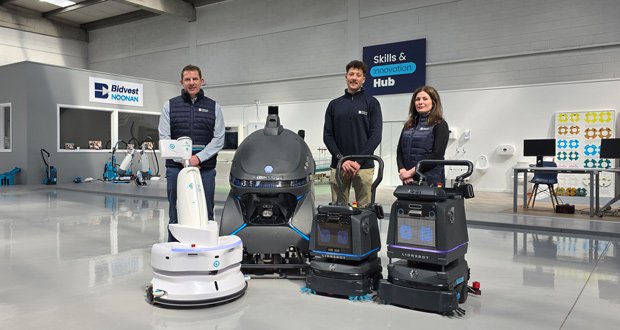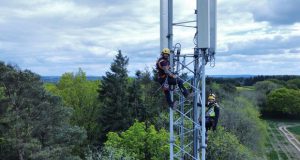The International Federation of Robotics (IFR) has published its latest World Robotics report, which looks at the performance of the global robotics market in 2024. Peter Smyth, Innovation and Technology Director at Bidvest Noonan answers a series of questions on the pivotal insights from the report for the facilities management sector, as an industry undergoing rapid technological transformation in the UK.
- What are your key takeaways from the IFR’s 2025 report from an FM perspective?
The IFR report highlights substantial growth in robot installations in recent years, with collaborative robots increasing by nearly 150 per cent over the past five years. That’s particularly relevant for FM, where cobots are designed to complement and support people in their roles.
From an FM perspective, the strongest growth is in cleaning, where installations rose by more than 30 per cent in a single year. We are also beginning to see encouraging signs of adoption in security.
Another key takeaway is the role of AI. The report highlights ‘physical AI’, which makes robotics practical in the dynamic environments we manage. At the same time, while humanoid robotics has received a lot of media attention, the report makes clear that they are still at an early stage, with unproven applications in FM.
Looking forward, we expect to see greater integration between robotics and the digitalisation of buildings. In the near future, Facility Managers may monitor and deploy machines through digital twins, using a single interface to coordinate multiple systems. For example, occupancy sensors may signal that a space has not been used and trigger a robotic cleaning machine to adjust its schedule accordingly.
- What are the principal benefits of the increased deployment of robots in FM?
The benefits of robotics in FM are easy to see:
- Enhanced efficiency, consistency & quality: Robots deliver reliable, repeatable results every time, reducing human error and increasing the overall quality of work.
- Improved wellbeing & job satisfaction: Cobots reduce the strain of repetitive, physically demanding work, giving employees more scope to focus on higher-value activities.
- Sustainability: Modern cleaning machines are designed to optimise resources and can reduce environmental impact by up to 90 per cent compared with manual methods, thanks to reduced carbon emissions, water, chemical, and energy use.
- Data-driven insights: Robotics generates valuable data, such as how long tasks take, or how much water and energy are used, providing an additional layer of assurance and performance auditing that supports continuous improvement.
Together, these benefits strengthen retention, improve team performance, and enhance service outcomes for our customers.
- Are there any sectors in particular where Bidvest Noonan is seeing a growing demand for FM robotics?
We’re seeing the fastest adoption in environments with large open areas requiring frequent cleaning, such as shopping centres and university campuses. These spaces benefit from large-scale cleaning machines that can cover vast floor areas efficiently.
At the same time, more compact machines are finding a role in office environments, where they support day-to-day cleaning. Robotics is also expanding into grounds maintenance, with robotic lawnmowers complementing our teams in large campuses and enclosed outdoor spaces such as manufacturing and pharmaceutical sites.
We are proud of our role in driving adoption across multiple sectors. For example, we are working with the Singapore University of Design & Technology on a stair-cleaning robot, an innovation that will help extend robotics into more complex environments.
- How much of a positive impact is the integration of AI in robotics making in FM?
We’ve been investing in robotics for many years, and, looking back, the early models were very limited. They could only operate in a narrow set of environments. That has changed in recent years, and AI has played a significant role in this progress.
Today, robots can sense their surroundings and adapt to unpredictable environments in a way that simply wasn’t possible before. This shift is driving adoption in areas such as cleaning and lawn care, where cobots have become a very valuable asset to our service delivery teams.
Today’s robotic machines generate valuable data. They provide information about the spaces they work in and also record how the work itself is being carried out, for example, when and how long it took to clean a floor, or how much water and energy were used. AI helps us interpret this data, extract insights, and identify needs, which in turn improves how we manage facilities.
- Are there any innovations Bidvest Noonan is working on to expand the company’s robotics footprint across FM?
Yes, absolutely. At Bidvest Noonan, we have a dedicated Innovation and Technology team who are actively working to expand our use of robotics. This team delivers workshops across the UK and Ireland, helping our customers and colleagues to explore new technologies and understand how they can add value. We also have a purpose-built Innovation and Technology Hub, which we use to host both real-world and virtual events, showcasing the latest developments in robotics and FM technologies.
Our innovation team plays a very hands-on role in adoption. They run pilots for customers, support our operations teams as new technologies are introduced, and make sure that robotics is successfully integrated into live environments. This approach has already proven very successful for our business.
Beyond this, our team maintains a strong global outlook. They regularly travel internationally to see new technologies in use, build partnerships, and identify innovations that can be brought back to the UK and Ireland. Right now, for example, we are working with partners on some very exciting robotics capable of carrying out a wider variety of tasks, and we look forward to integrating these kinds of advances into our services in the future.





